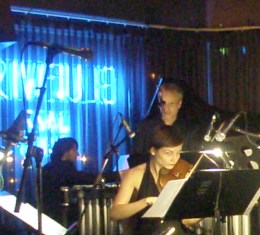
Nash/Constella Fill Blue Wisp
|
Ted Nash (saxophone) at the Blue Wisp. Rusty Burge in background.
|
It is entirely fitting, a stroke of genius perhaps, that Tatiana Berman, founder/artistic director of Cincinnati’s Constella Festival of Music and Fine Arts, should have commissioned jazz saxophonist Ted Nash (of the Jazz at Lincoln Center Orchestra led by Wynton Marsalis) to compose a work for the inaugural festival. Not only does jazz perfectly fit the definition of chamber music (music for small ensemble, one player to a part), but Constella is a multi-media festival that comprehends a variety of genres in a variety of venues around town.
Nash’s work, “Suite Ivette”, a double quartet for jazz and string quartet, received its world premiere before a sold-out house Oct. 29 at the Blue Wisp Jazz Club. Judging by its reception and the enthusiasm of the players, the twain should meet more often (though with more amplification for the strings, which would have enhanced the effect).
Nash “loves fusing different forms of music,” he says. “I love getting together musicians who ordinarily don’t cross paths. Music is music, and I don’t see that it is so important to distinguish between forms. Stylistically, there are obvious differences, but there is more that is similar than different.”

L to R: Dan Karlsberg (piano), Tatiana Berman (violin), Rusty Burge (vibraphone).
|
Participating in the double quartet were Nash (on saxophone and flute), Rusty Burge (vibraphone and percussion), Dan Karlsberg (piano), Jim Leslie (drums). Michael Sharfe (acoustic bass), Berman (violin), Suzanna Barnes (electric violin), Yael Senamaud-Cohen (viola) and Susan Marshall-Petersen (cello).
“Suite Ivette” (written for someone “very special in my life,” Nash said) is in three movements, “Windows,” “The 405” and “Mona Passage.” Lasting between 20 and 25 minutes, depending on the length of improvisation, it is a cross between classical music and jazz. Nash describes it as “all about traveling, both physically and metaphysically.”
“Windows” opened with a cello/vibraphone crescendo leading to the entrance of Nash on tenor sax (repeated three times), and then a string melody with a bass beat (Berman sounded right at home here). This was by way of introduction to improvised sections for sax, bass and piano. Nash turned to alto flute in “The 405” (referring to Interstate 405 in southern California). This movement bore a resemblance to Stravinsky’s chamber work, “L’histoire du soldat” (“The Soldier’s Story”) with its use of strings in a rhythmic context.
The final movement, “Mona passage” (the name of the strait separating Puerto Rico and the Dominican Republic) incorporated tango and considerable South American color. Violinist Barnes, a student at the University of Cincinnati College-Conservatory of Music, improvised handily at one point. A more classical moment for viola, cello and drums followed, after which the temperature grew “hot” again, with an improvisation by Nash. The Latin flavor grew even more pronounced with the introduction of a sultry little melody, and Leslie unleashed a tour de force improvisation on drums before a whistle signaled the end.
The show closed (to be repeated at 10 p.m. with another sold-out house) with two movements from Nash’s “Rhyme and Reason” (1999), his first essay in blending string quartet and jazz. “Longing,” which sounded just like its title, featured the octet in a beautiful (almost romantic) effusion. Barnes’ violin was prominent, dovetailing directly into Nash’s delayed entrance on sax, which held forth to the end.
“Sisters” (named for his two daughters, Nash said) began with a riff on cymbal. Burge improvised at length on vibraphone, succeeded by Karlsberg on piano. It was “cool” to hear (and also to play, I imagine) Marshall-Petersen doubling Nash on sax as the movement really got going. It was fun, also, to hear shouts of “bravo” in a jazz club. May there be many more.